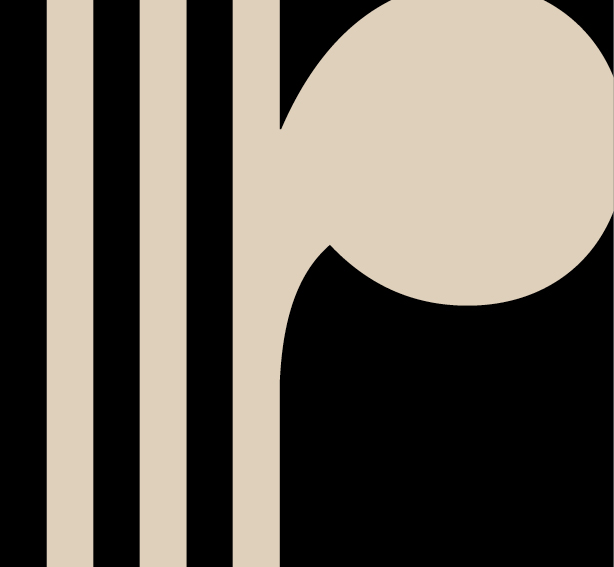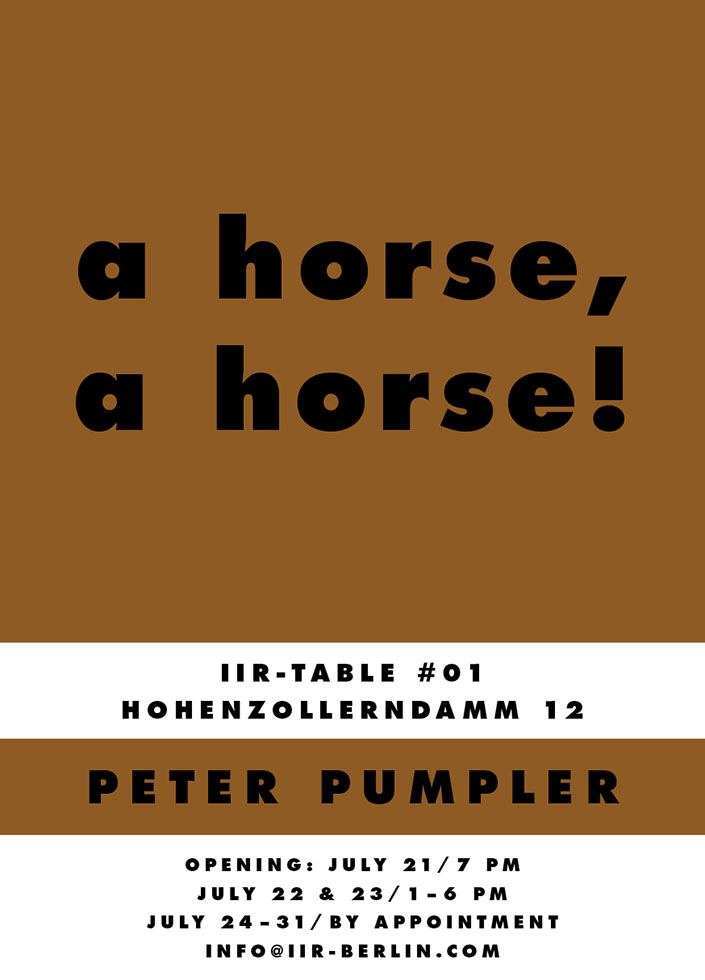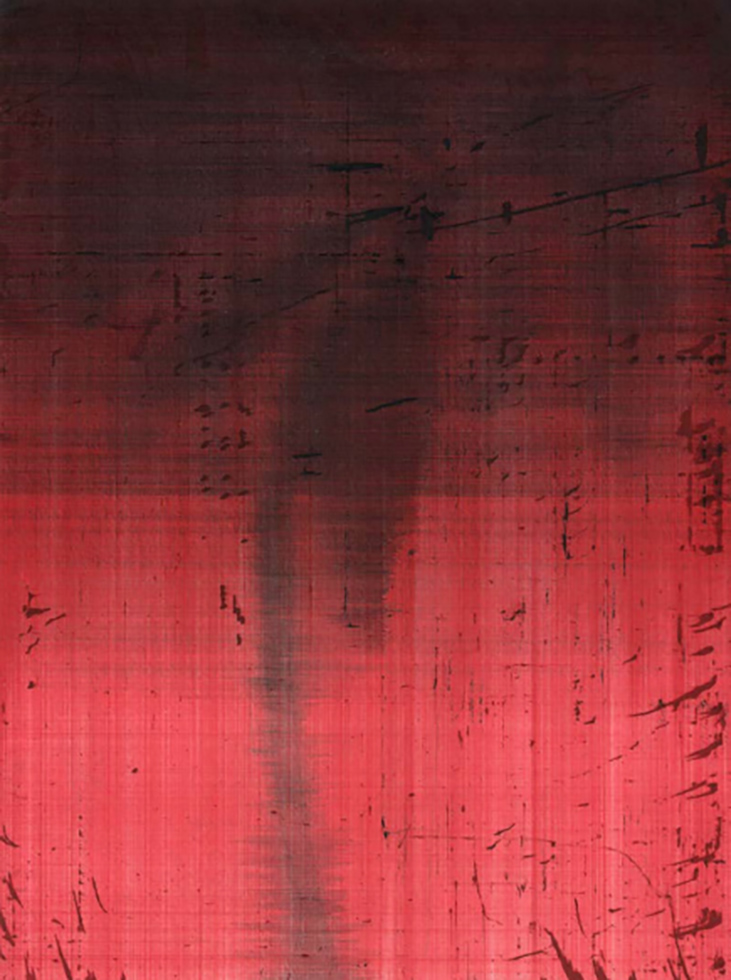
claus georg stabe
sundowner III
ball pen on paper, 2016
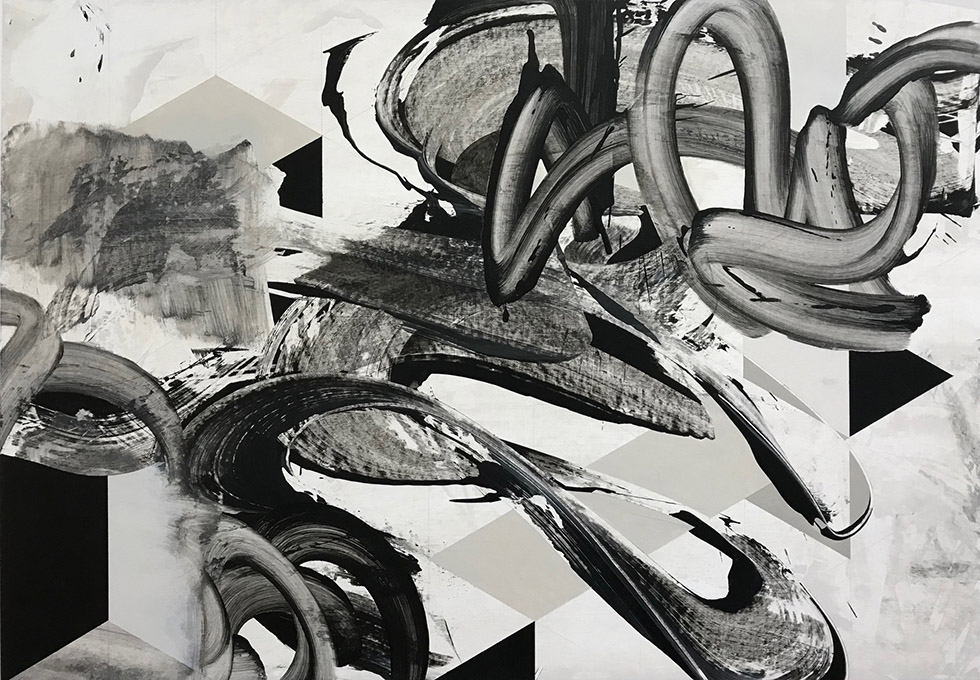
ab van hanegem
untitled
acrylic on paper, 2023
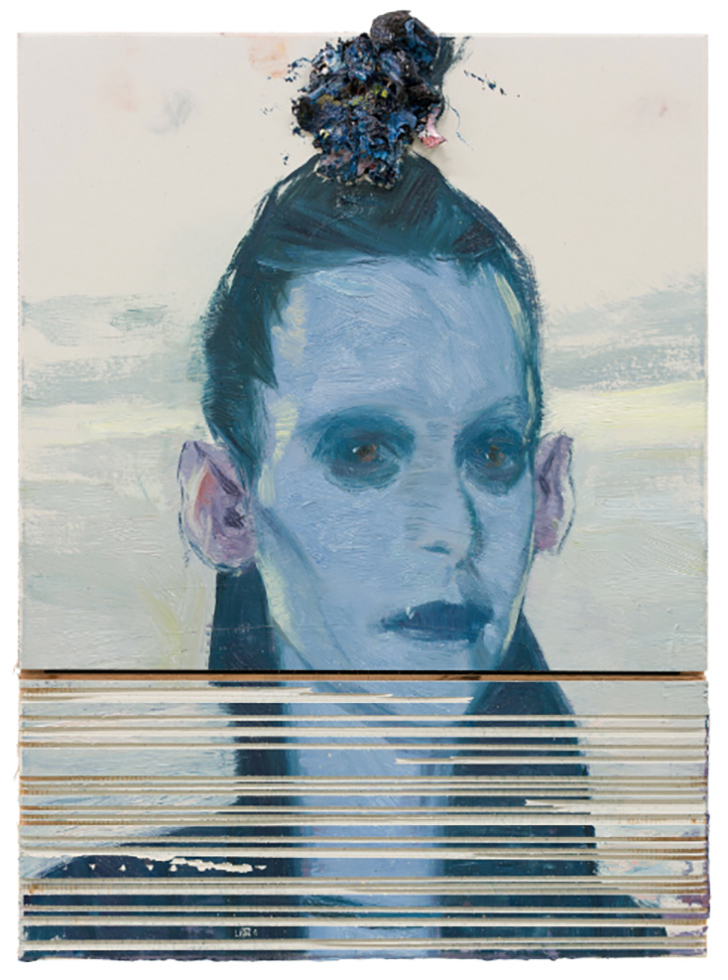
ruprecht von kaufmann
die tochter
oil on linoleum, 2021
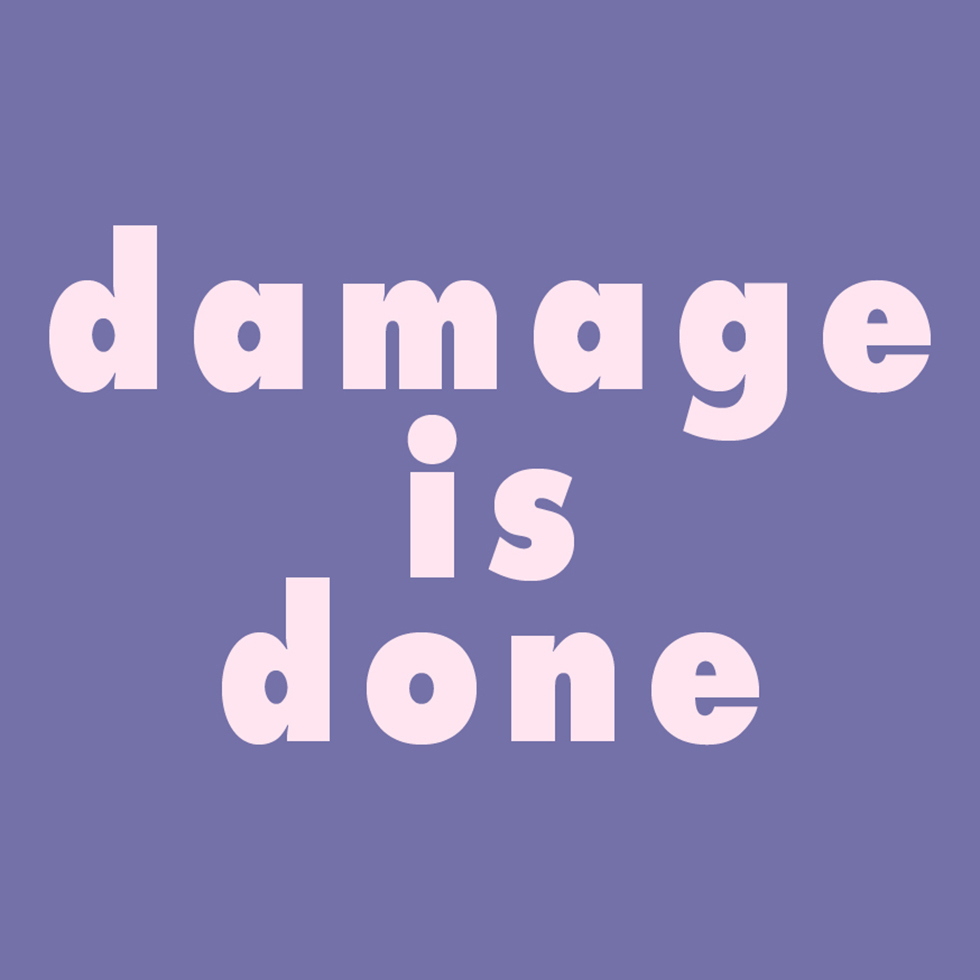
iir_room_04
damage is done
the mistake as a chance
claus-georg stabe
ab van hanegem
ruprecht von kaufmann
upcoming summer 2024
when your childhood friend’s inglorious fall from the swing into the hedge is forever etched in your memory, a clumsy mistake becomes a symbol of childlike innocence and playfulness. there are said to be people who keep lists of the ten biggest mistakes of their lives, and choosing the wrong highway entrance could turn into something more than a gag you’ve often admired while streaming
it is our consciousness that makes the distinction as such in the first place – our judgmental value system distributes the good and the bad cards. the mistake is a proven and necessary counterpart in all major gaming activities, be it russian roulette or the bible. anyone who has ever been on the cross now has to cuddle up to the group 24/7, that can and will burn under everyone’s nails sooner or later. despite all the fun and frolic, the mistake is initially frightening, painful and above all one thing – annoying.
in an artistic vita, mistakes, misconduct and other aberrations are purposeful, at least for those who know how to deal with them. the now wiser artist has tested, learned and then proven himself. on his individually guided path, the flaws have been erased and the space he takes up has been cleared with plain handwriting. the content unambiguous, the form polished, the fresh work presented to a broadly interested audience sends out the good news – masterly, flawless. from the perspective of the unblemished work, it is initially difficult to understand the error as an opportunity. nevertheless, it is understandable how wade guyton, with the first misprints of his xerox series in his hands, dawns the realization of what wondrous new territory he is entering.
the artists represented in the exhibition ‚damage is done‘ must have lived through that very moment of the damaged, the wrong one and replaced the initial shock with understanding. the blotting tool and the use of its expansive trace is the starting point in the works of claus-georg stabe. ab van hanegem deliberately provides an insight into his working technique by exposing the masterful penetration of isometric spatial elements with informal gestures through obvious technical errors, and ruprecht von kaufmann passionately plows through his realistic-illusionistic pictorial spaces, making deep cuts or ornamental damage.
what they all have in common is the obvious mistake as a brashly used interface, which they cleverly use to connect them, but then release this straight back into their diametrically different positions. a drip here, a wipe there, then the cut. masterly despite the flaws, or precisely because of them.
iir_room_04
damage is done
the mistake as a chance
claus-georg stabe
ab van hanegem
ruprecht von kaufmann
upcoming spring 2024
when your childhood friend’s inglorious fall from the swing into the hedge is forever etched in your memory, a clumsy mistake becomes a symbol of childlike innocence and playfulness. there are said to be people who keep lists of the ten biggest mistakes of their lives, and choosing the wrong highway entrance could turn into something more than a gag you’ve often admired while streaming
it is our consciousness that makes the distinction as such in the first place – our judgmental value system distributes the good and the bad cards. the mistake is a proven and necessary counterpart in all major gaming activities, be it russian roulette or the bible. anyone who has ever been on the cross now has to cuddle up to the group 24/7, that can and will burn under everyone’s nails sooner or later. despite all the fun and frolic, the mistake is initially frightening, painful and above all one thing – annoying.
in an artistic vita, mistakes, misconduct and other aberrations are purposeful, at least for those who know how to deal with them. the now wiser artist has tested, learned and then proven himself. on his individually guided path, the flaws have been erased and the space he takes up has been cleared with plain handwriting. the content unambiguous, the form polished, the fresh work presented to a broadly interested audience sends out the good news – masterly, flawless. from the perspective of the unblemished work, it is initially difficult to understand the error as an opportunity. nevertheless, it is understandable how wade guyton, with the first misprints of his xerox series in his hands, dawns the realization of what wondrous new territory he is entering.
the artists represented in the exhibition ‚damage is done‘ must have lived through that very moment of the damaged, the wrong one and replaced the initial shock with understanding. the blotting tool and the use of its expansive trace is the starting point in the works of claus-georg stabe. ab van hanegem deliberately provides an insight into his working technique by exposing the masterful penetration of isometric spatial elements with informal gestures through obvious technical errors, and ruprecht von kaufmann passionately plows through his realistic-illusionistic pictorial spaces, making deep cuts or ornamental damage.
what they all have in common is the obvious mistake as a brashly used interface, which they cleverly use to connect them, but then release this straight back into their diametrically different positions. a drip here, a wipe there, then the cut. masterly despite the flaws, or precisely because of them.

claus georg stabe
sundowner III
ball pen on paper, 2016

ab van hanegem
untitled
acrylic on paper, 2023

ruprecht von kaufmann
die tochter
oil on linoleum, 2021

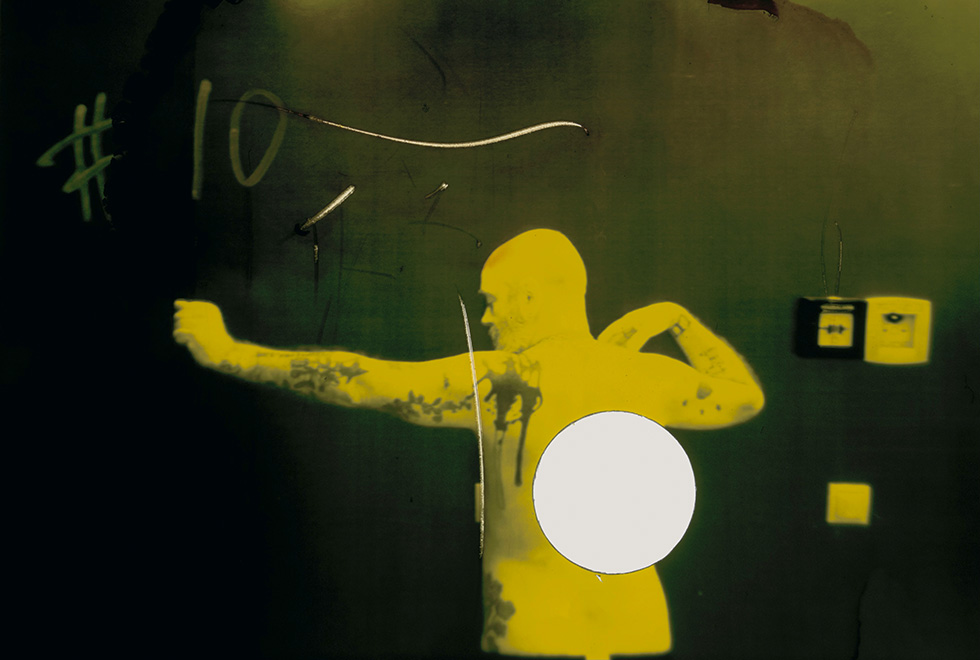
peter welz, study in colour and movement [portrait #5 I douglas gordon], photography, 2023

iir_table_02
filiation
peter welz
january 20, 2024
hohenzollerndamm 12, berlin
when the father of the theory of descent, charles darwin, is made a monkey of in contemporary caricatures with a shaggy fur and is subjected to ranting and rage from the pulpits, the attentive descendant has certainly learned one thing – not all zealous research is lauded. other thinkers, then again, succeed in devising glorious lines and weaving loose threads into a traceable web. we certainly know that whoever spoones up the bacon always finds picasso in that soup and their shared forging of high and low grew out of more than just a cautious interest of the younger in the other’s proceeding.
like his inextricably intertwined sources of inspiration, peter welz weaves the bond between original and image again and again in order to trace his questioning of the figure in space, borrowed from bacon and picasso, ever more urgently. the film still, taken from one of his videos, becomes a large-format print on the studio wall, photographed again, edited and back to start. corresponding to bacon’s studio, a compressed construction of newspaper clippings, photos of his own or other people’s work, canvases, brushes and tubes of paint, resembling an explosion crater, the studio itself becomes part of the creative process in total.
as much as order and succession can be related to each participant at that point, welz, the third and youngest pearl in the chain, succeeds in creating an independent position, which he well knows how to spice up with the help of certain names from the art world. forsythe, bronson and gordon, to name but a few, turn and screw themselves into his medially wide-ranging universe. what remains is time. time that breathes past and future coeval. cocooned and infinite.
iir_table_02
filiation
peter welz
january 20, 2024
hohenzollerndamm 12, berlin
when the father of the theory of descent, charles darwin, is made a monkey of in contemporary caricatures with a shaggy fur and is subjected to ranting and rage from the pulpits, the attentive descendant has certainly learned one thing – not all zealous research is lauded. other thinkers, then again, succeed in devising glorious lines and weaving loose threads into a traceable web. we certainly know that whoever spoones up the bacon always finds picasso in that soup and their shared forging of high and low grew out of more than just a cautious interest of the younger in the other’s proceeding.
like his inextricably intertwined sources of inspiration, peter welz weaves the bond between original and image again and again in order to trace his questioning of the figure in space, borrowed from bacon and picasso, ever more urgently. the film still, taken from one of his videos, becomes a large-format print on the studio wall, photographed again, edited and back to start. corresponding to bacon’s studio, a compressed construction of newspaper clippings, photos of his own or other people’s work, canvases, brushes and tubes of paint, resembling an explosion crater, the studio itself becomes part of the creative process in total.
as much as order and succession can be related to each participant at that point, welz, the third and youngest pearl in the chain, succeeds in creating an independent position, which he well knows how to spice up with the help of certain names from the art world. forsythe, bronson and gordon, to name but a few, turn and screw themselves into his medially wide-ranging universe. what remains is time. time that breathes past and future coeval. cocooned and infinite.

peter welz, study in colour and movement [portrait #5 I douglas gordon], photography, 2023

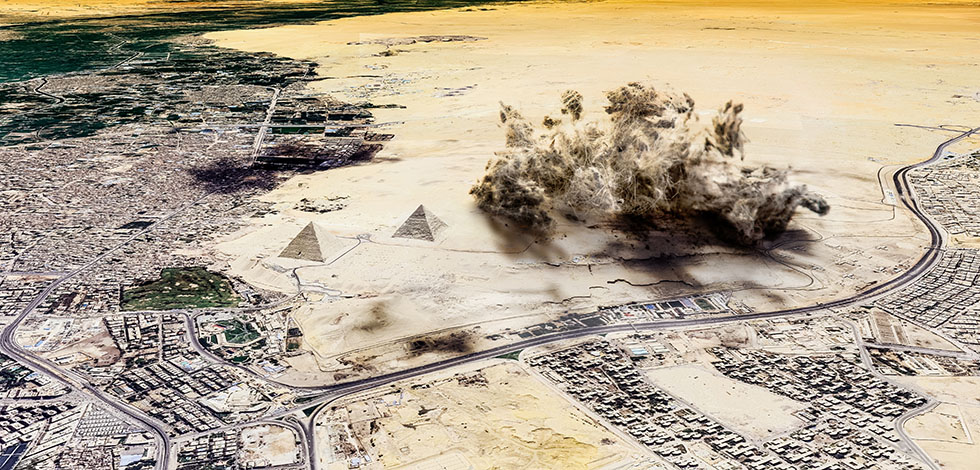
martin eugen raabenstein, pigpen’s palace, photography, 2023

iir_room_03
hitherto /3s
martin eugen raabenstein
november 03, 2023
bürckner eck, hobrechtstasse 39, berlin
for dust you are and to dust you will return. the condemning words of god after the fall of man miraculously transformed into the affectionate character study of a child damned to filthiness.
peanuts, the american comic strip classic, created by charles m. schulz introduced in the 1950s, pictures a boy called pigpen, surrounded by clouds of dust, dirty and disheveled, unable to be clean. one day charlie brown, accepting him for what he is, comments: ‚don’t think of it as dust. just think of it as the dirt and dust of far-off lands blowing over here and settling on pigpen. it staggers the imagination. he may be carrying the soil that was trod upon by solomon or nebuchadnezzar or genghis khan!‘.
dust, god’s curse and condemnation to a toilsome life on the one hand, and the exhilaratingly compassionate twirl of one of the most popular comic authors on the other, are both approach and terminus in this examination of the uttermost unpleasant element of our existence. dust, dirt, discarded and expelled, unloved whether as waste or as outcast, is seized to form a conceptual project: welcome to pigpen’s palace, shaped to spin and dominate. this is no wall of hatred or revenge – a mirror rather. by the sweat of your brow it will crumble again, eventually.
projects
iir_room_03
hitherto /3s
martin eugen raabenstein
november 03, 2023
bürckner eck, hobrechtstasse 39, berlin
for dust you are and to dust you will return. the condemning words of god after the fall of man miraculously transformed into the affectionate character study of a child damned to filthiness.
peanuts, the american comic strip classic, created by charles m. schulz introduced in the 1950s, pictures a boy called pigpen, surrounded by clouds of dust, dirty and disheveled, unable to be clean. one day charlie brown, accepting him for what he is, comments: ‚don’t think of it as dust. just think of it as the dirt and dust of far-off lands blowing over here and settling on pigpen. it staggers the imagination. he may be carrying the soil that was trod upon by solomon or nebuchadnezzar or genghis khan!‘.
dust, god’s curse and condemnation to a toilsome life on the one hand, and the exhilaratingly compassionate twirl of one of the most popular comic authors on the other, are both approach and terminus in this examination of the uttermost unpleasant element of our existence. dust, dirt, discarded and expelled, unloved whether as waste or as outcast, is seized to form a conceptual project: welcome to pigpen’s palace, shaped to spin and dominate. this is no wall of hatred or revenge – a mirror rather. by the sweat of your brow it will crumble again, eventually.

martin eugen raabenstein, pigpen’s palace, photography, 2023

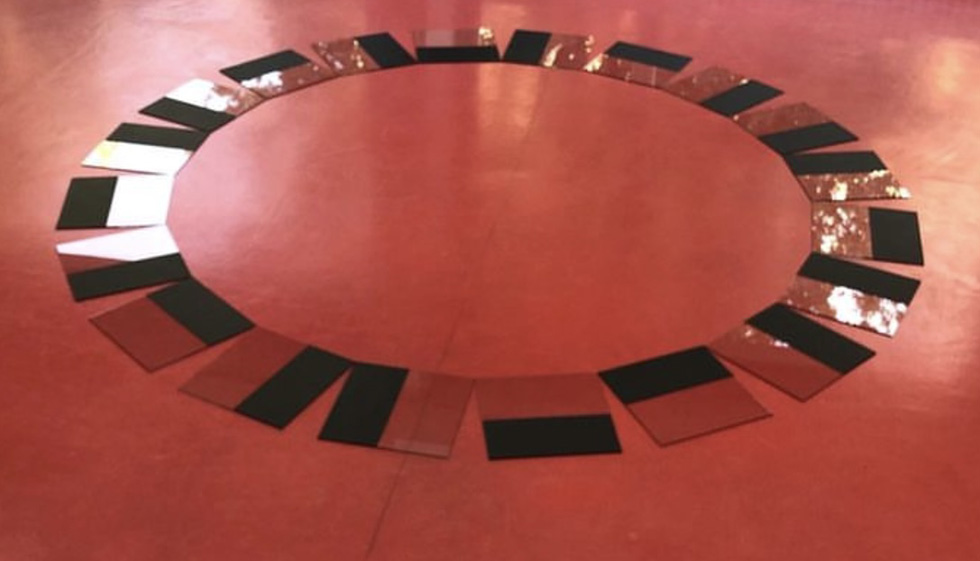
markus keibel, linie (20 parts), ⌀ 370 cm, 2022

isabel kerkermeier, auf zwei beinen, 310 x 244 x 10 cm, 2015
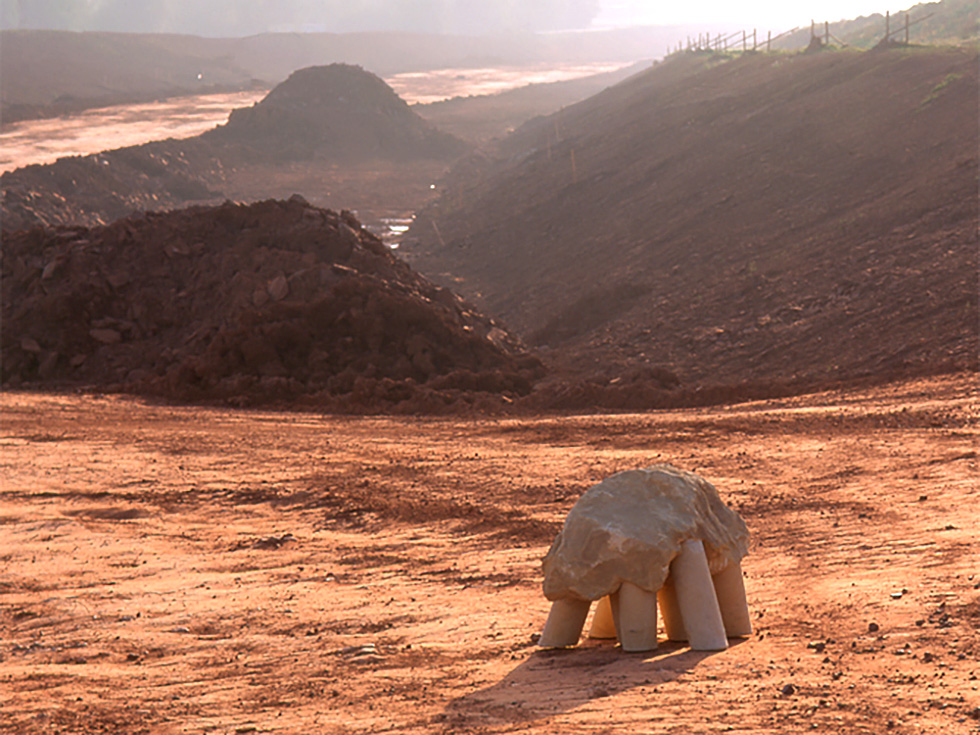
volker ries, untitled, 41 x 47 x 63 cm, 1992

iir_room_02
there might be some
sense in knocking
markus keibel
isabel kerkermeier
volker ries
september 29, 2023
oranienstrasse 183, berlin
sly fumes, creeping around the trees in the morning after the storm, bear little witness to the power tugging hard at crowns during nighttime. moments later the sun sinks the forest into oppressive sultriness. rain, mist, humidity, clouds, rain – an everlasting circuit and tune of becoming and passing. everything flows calling blur an awesome source of artistic engagement. wherever the origin and aim of this practise may be stashed, the not-yet-quite-being and not-anymore-being converge in an intriguing manner, eventually. this captured, abstracted circulation-instant marks the nexus around which the three artists presented here turn.
while isabel kerkermeier’s delicate dismantling of found advertising banners reduce their former function to merge into a new, indipendant aesthetic, volker ries opts for the opposite practice. his works, although promising a certain functionality, are inoperable on closer examination, or else, form and function appear as fragments of a larger, no-longer- or not-yet-existing context of meaning. furthermore, markus keibel’s work circulates in both directions. transformation and metamorphosis are the essential principles of his modus operandi – thus playing with the manifested voids of his peers.
confidence in an unbroken artistic joy of discovery yields the very space in which vision, decay, achievement or loss of practicability form the incessant drive to move, thus giving the status quo the finger.
iir_room_02
there might be some
sense in knocking
markus keibel
isabel kerkermeier
volker ries
september 29, 2023
oranienstrasse 183, berlin
sly fumes, creeping around the trees in the morning after the storm, bear little witness to the power tugging hard at crowns during nighttime. moments later the sun sinks the forest into oppressive sultriness. rain, mist, humidity, clouds, rain – an everlasting circuit and tune of becoming and passing. everything flows calling blur an awesome source of artistic engagement. wherever the origin and aim of this practise may be stashed, the not-yet-quite-being and not-anymore-being converge in an intriguing manner, eventually. this captured, abstracted circulation-instant marks the nexus around which the three artists presented here turn.
while isabel kerkermeier’s delicate dismantling of found advertising banners reduce their former function to merge into a new, indipendant aesthetic, volker ries opts for the opposite practice. his works, although promising a certain functionality, are inoperable on closer examination, or else, form and function appear as fragments of a larger, no-longer- or not-yet-existing context of meaning. furthermore, markus keibel’s work circulates in both directions. transformation and metamorphosis are the essential principles of his modus operandi – thus playing with the manifested voids of his peers.
confidence in an unbroken artistic joy of discovery yields the very space in which vision, decay, achievement or loss of practicability form the incessant drive to move, thus giving the status quo the finger.

markus keibel, linie (20 parts), ⌀ 370 cm, 2022

isabel kerkermeier, auf zwei beinen, 310 x 244 x 10 cm, 2015

volker ries, untitled, 41 x 47 x 63 cm, 1992

iir_table_01
a horse,
a horse!
peter pumpler
july 21, 2023
hohenzollerndamm 12, berlin
when the corner of the mouth decides to smile and the scene spirals up in shared laughter, the participants are relaxed and the gang flow is harmonious. similar in facial expression but linked to a suitable diverse content, a grin sometimes opens up questions rather than offering solutions. a situational fork arises, initiating where and above all how the story will end.
the most striking examples of artistic personality mirrored in the corresponding work, so to talk of duchamp’s silence or beuys‘ hat, explicitly illustrate how much the artistic product and the underlying mental mechanics of the artist are inseparably entangled. just as peter pumpler may not be able to hide his very own grin for very long, the same energy flows out of all his works; bold, cheeky and provocatively naughty, uninhibitedly emitting a ‚ what exactly do you want, now?‘
trying to calmly bypass authentic smugness is a courageous but absurd major effort… the facts are clear. jump, it’s water only and if you truly assume you’ll need it …bring a swimsuit.
iir_table_01
a horse,
a horse!
peter pumpler
july 21, 2023
hohenzollerndamm 12, berlin
when the corner of the mouth decides to smile and the scene spirals up in shared laughter, the participants are relaxed and the gang flow is harmonious. similar in facial expression but linked to a suitable diverse content, a grin sometimes opens up questions rather than offering solutions. a situational fork arises, initiating where and above all how the story will end.
the most striking examples of artistic personality mirrored in the corresponding work, so to talk of duchamp’s silence or beuys‘ hat, explicitly illustrate how much the artistic product and the underlying mental mechanics of the artist are inseparably entangled. just as peter pumpler may not be able to hide his very own grin for very long, the same energy flows out of all his works; bold, cheeky and provocatively naughty, uninhibitedly emitting a ‚ what exactly do you want, now?‘
trying to calmly bypass authentic smugness is a courageous but absurd major effort… the facts are clear. jump, it’s water only and if you truly assume you’ll need it …bring a swimsuit.
yvonne wahl, return to go, installation, 2023
martin eugen raabenstein, influencer, photography, 2023

iir_room_01
the first time they had lunch
they talked about their experiences
with experience and she listened
so intently that he cried …
yvonne wahl
martin eugen raabenstein
june 16, 2023
west germany, berlin
everything we do, everything we have ever done, everything others do, with or against us, has an impact on our present age. in this context, both our successfully completed actions and the efforts that did not lead to an end, whose contributed energy supposedly came to nothing, are of significance. not only the people involved in our lives are of significant interest, but also the places we live and experience, the objects we use and the words and thoughts we formulate or suppress.
summarized, this tangle of memories forms our being, shapes the basis of our knowledge and, above all, our judgement of the world around us in the present time. encounters, conversations, escapes from houses, forest clearings, vehicles and toys are condensed in us with the associated mnemotised events.e
as well as it seems advisable not to fundamentally distrust this self-narrative, the gaps it contains are the most interesting part of this amalgam. faulty memories, descriptions by others or simply an exaggeration of facts inflated with cheeky poetry sometimes cross the not clearly definable border between too colourfully painted reality and sheer fiction.
in their works, yvonne wahl and martin eugen raabenstein illuminate precisely these gaps in a way that draws parallels and then again arrives at different conclusions; to show intermediate worlds and to question them at the same time. everything flows, dissolves and consolidates at the same time, a pas de deux of a different kind.
iir_room_01
the first time they had lunch
they talked about their experiences
with experience and she listened
so intently that he cried …
yvonne wahl
martin eugen raabenstein
june 16, 2023
west germany, berlin
everything we do, everything we have ever done, everything others do, with or against us, has an impact on our present age. in this context, both our successfully completed actions and the efforts that did not lead to an end, whose contributed energy supposedly came to nothing, are of significance. not only the people involved in our lives are of significant interest, but also the places we live and experience, the objects we use and the words and thoughts we formulate or suppress.
summarized, this tangle of memories forms our being, shapes the basis of our knowledge and, above all, our judgement of the world around us in the present time. encounters, conversations, escapes from houses, forest clearings, vehicles and toys are condensed in us with the associated mnemotised events.e
as well as it seems advisable not to fundamentally distrust this self-narrative, the gaps it contains are the most interesting part of this amalgam. faulty memories, descriptions by others or simply an exaggeration of facts inflated with cheeky poetry sometimes cross the not clearly definable border between too colourfully painted reality and sheer fiction.
in their works, yvonne wahl and martin eugen raabenstein illuminate precisely these gaps in a way that draws parallels and then again arrives at different conclusions; to show intermediate worlds and to question them at the same time. everything flows, dissolves and consolidates at the same time, a pas de deux of a different kind.
